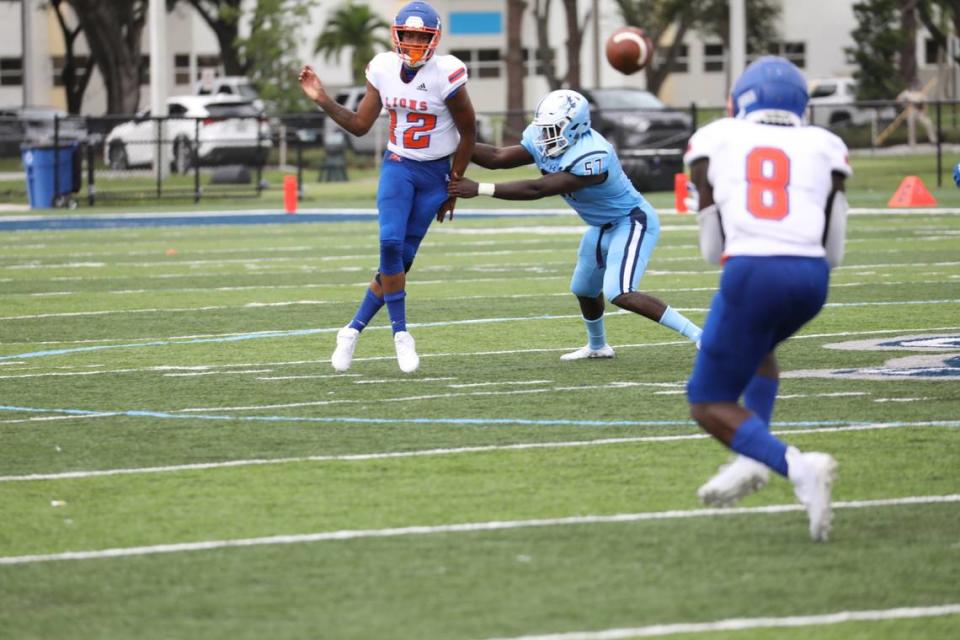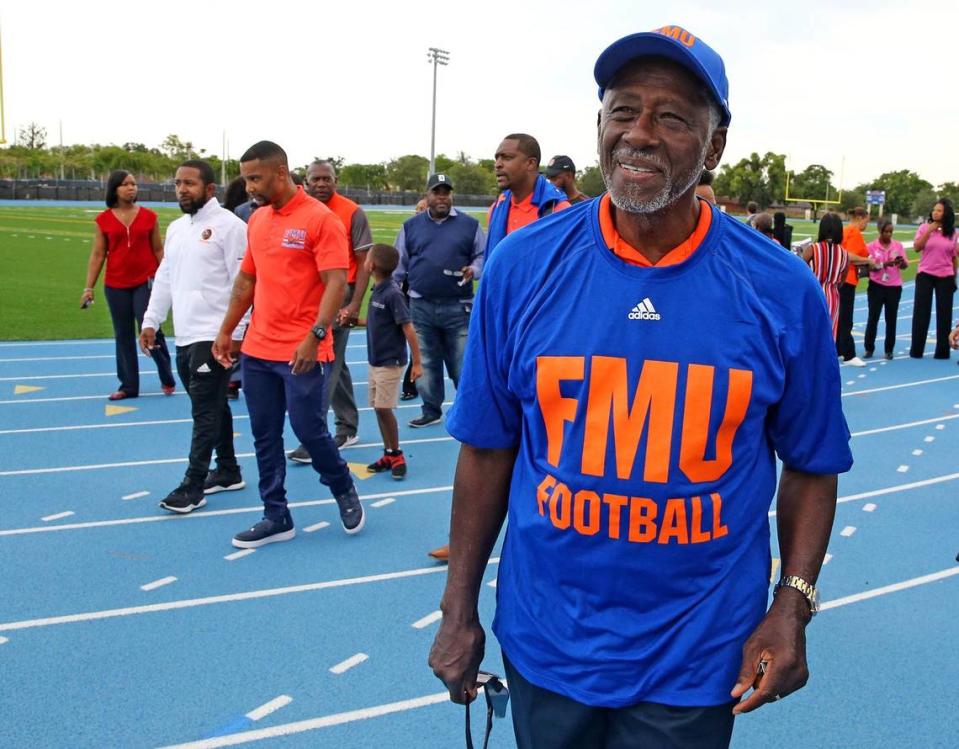Florida Memorial is having COVID-19 issues. Some athletes are irate with its handling.
COVID-19 cases have surged on Florida Memorial University’s Miami Gardens campus in recent weeks, and the athletic programs, which compete as part of the National Association of Intercollegiate Athletics, have been hit hard.
Florida Memorial, which resumed its football program for the first time since 1958, has now twice postponed its first home game.
South Florida’s historically Black college was founded in 1879 as Florida Baptist Institute in Live Oak — a town about 80 miles from Jacksonville. About 1,100 students attend the university, which moved to Miami-Dade County in 1968. Only about 500 students are currently on campus. Athletes returned to the facilities in August to prepare for the fall sports season.
The university also postponed a men’s soccer game last week. Five athletes, one parent and an athletic department employee told the Miami Herald the outbreaks are significant, in at least one case forcing an entire team into isolation. Speaking out on social media about the issues cost at least one athlete a spot on her team, a parent said.
All sources requested to remain anonymous for fear of further retribution.
On Monday, the school’s student government association hosted a conference call with athletes on video conferencing to discuss concerns and options moving forward, according to a recording of the call obtained by the Herald. Athletes could be heard saying they did not believe the school’s administration has done enough to keep students safe amid the pandemic.
Students say the university is lax about contact tracing, and isn’t requiring students who have been exposed to the virus to isolate. The athletic department tests athletes every three weeks, athletic director Ernest T. Jones said. That is much less frequent than in other, larger college programs. The Miami Hurricanes and Atlantic Coast Conference, in comparison, test athletes three times per week.

The current situation
Although the university has not released specific numbers about positive tests, the president acknowledged last Wednesday the school has experienced an uptick in COVID-19 cases, although he didn’t refer to it as an outbreak.
“Earlier today, we were notified that an increased number of students and staff members who were tested this week received a positive result for COVID-19,” Jaffus Hardrick wrote in an update on the university website entitled “COVID-19 Update 15.” “Upon learning this information, we immediately followed the Florida Department of Health and Centers for Disease Control protocols.”
The university has postponed multiple sporting events and placed dozens of athletes in isolation. Each of the school’s 13 teams has had at least one player or coach test positive for the coronavirus in the past two weeks, an athletic department employee said.
On Friday, the Lions announced they were postponing their first home football game for “COVID-19 related concerns.” They were scheduled to host Miami Gardens’ St. Thomas University on Saturday. On Tuesday, the university postponed the game again until November. The school also postponed a men’s soccer game against West Palm Beach’s Keiser University, which had been scheduled for Saturday, to an undetermined date. The women’s soccer team, however, played as scheduled Saturday on the road against Webber International University in Babson Park.
Florida Memorial’s next scheduled sporting event is a men’s soccer game Tuesday, Oct. 13, after the university postponed all games this weekend.
“There’s nothing wrong with two teams getting together to decide that they want to play a contest at a later date,” Jones said.
Jones declined to reveal the number of athletes who have tested positive for COVID-19. An athlete in a fall sport said the entire volleyball team is in isolation until at least Monday after a teammate tested positive last week. Jones declined to comment on specific cases, citing privacy rules. Students are informed when there’s a positive test on campus, but the university doesn’t disclose numbers to them or reveal who has tested positive.

How did it happen?
The uptick in cases traces to the start of last week, when an athletic department employee, who works closely with athletes in all sports, tested positive for the virus. The test result came just days after the employee traveled on a bus with the football team to and from a game against Webber International in Polk County, the athletic department source said.
After the positive test, the athletic department began testing other athletes and found the virus spreading around the students on campus, about 30 percent of whom are affiliated with athletics, Jones said. About 30 football players have tested positive, the athletic department source said.
This is a big year for the Lions. For the first time since 1958, Florida Memorial, the only historically Black college or university (HBCU) in South Florida, is fielding a football team, and it’s the only HBCU playing the sport this fall. The Lions, who play most sports in the Sun Conference and are an affiliate member for football in the Mid-South, decided to continue. They played three games in September before the postponements began.
The athletic department and university COVID-19 policies include mandatory masks, social-distancing requirements and widely available hand sanitizer. The school itself also offers free weekly on-campus testing every Thursday. In August, the NAIA “determined it was inappropriate to require a single testing protocol for all its members.”
For about a month, everything went smoothly. The school, athletes and employees, following the university’s established protocols, got into the middle of September until a positive test was reported and into October before any sporting events were postponed.
Eventually, athletes said they noticed less adherence to mask and social-distancing rules. Athletes said the JC Sams Student Activities Center, where athletics are housed, is not regularly cleaned and the university has hosted multiple nonessential events, including an athletic awards ceremony with mandatory attendance. Jones said they “bomb the building” after all major events. In other words, clean out the areas.
On Friday, the university “decided to close the campus until further notice,” meaning, “students will not be able to leave campus unless they have a job off campus or need to purchase essential items,” and visitors are banned and commuter students can’t enter residence halls. The university also implemented a $100 fine for individuals not wearing a mask or face covering.
“A lot of people are trying to put it off on the students, and I’m not saying we’re not at fault,” one athlete in a fall sport said. “What they needed to understand is that there was going to come a point in time when stuff started to feel normal again and that’s what happened. I feel like we started to get a little too comfortable.”
Said Jones: “We’re bound by the NAIA, the Sun Conference, the Mid-South Conference, Florida Memorial University, Broward County, Dade County. Being a man or a woman, or an administrator or a leader, we are bound to do the right thing. What happens is that some of these young people may not always do — ’Wear your mask. Hey, can you put your mask up?’ You deal with those. You have to just keep trying, and keep trying and keep trying. That’s why we had to implement a fining process policy on our campus.”
A video also circulated on social media this week showing a tightly packed crowd at a volleyball match inside the school’s gymnasium. While Jones said seats are clearly marked for social-distancing purposes, the rules are not always enforced. Volleyball players asked if they could play games without fans in attendance, multiple players said, and the requests were denied.
Since @ErnestTJones @GoFmuLions & administration is trying to say that the article and outbreak is false.. and that @FLMemorialUniv is practicing social distancing, here is proof of students and close contact with NO MASK on school premises. This was from last Wed Volleyball game pic.twitter.com/xDKt4bHGE3
— Señorita Hacer Bien (@MissDoRight13) October 6, 2020
Another athlete said she was already reluctant to come to campus in the fall, but did so out of fear of losing her scholarship. Scenes like those only increased her concern.
“I didn’t want to come here to play in fall because of everything and, yes, I did feel pressure to come to play because maybe my scholarship can be taken away,” the athlete said. “They didn’t tell me concretely, but I was afraid. Is this going to happen? Because we didn’t know what was going on.”

How Florida Memorial is responding
Like many schools, Florida Memorial has residence halls and dorm rooms set aside for COVID-19-positive students, and the university has also moved some students to a nearby hotel.
One of the athletes, who lives in Living & Learning Residence Hall #4, said the university has also started moving COVID-19-positive roommates into this residence hall, as evidenced by brown paper meal bags sitting outside her neighbors’ doors.
This athlete also said she should be in isolation based on contact tracing — two of her roommates tested positive — but the university hasn’t contacted her about any sort of meal service, meaning she still has to go to the dining hall to pick up food. While she’s there, she also picks up a meal to deliver to one of her teammates.
“Obviously, with common sense, I know that I need to quarantine, but they’re not enforcing it,” the athlete said. “I haven’t gotten an email like, ‘Hey, because of your roommates testing positive, you have to be quarantined. We’re going to have to bring food to your dorm.’”
The parent of one athlete who tested positive said her daughter has even been kicked off of the women’s basketball team in the last week as student frustration has intensified. This athlete was one of the most outspoken on social media in the last week and got a call from her coach about her Twitter activity.
The coach said he spoke with the athletic director, the parent said, and told her, “She can no longer be a part of his program.”
Jones said he is unaware of any athletes being removed from teams based on social-media activity. As of Tuesday, the player was still listed on the school’s online roster.
“I’m not aware of that,” Jones said. “We do a really, really good job here at Florida Memorial University. It’s truly the next day here at Florida Memorial University. We’re about educating these students, these athletes. We’re about giving them a voice, giving them an opportunity to say what it is they want to say and do what it is they want to do, and trying to teach them how to do it.”
Said the parent: “The young adults on this campus, they’re frightened, for one, because the athletic department is dangling their scholarship over their head as though they can snatch it away just like that. Because you don’t want to provide a safe environment, these kids don’t feel safe, they want to leave and you’re telling them, basically, if they do, they’ve violated their contract and it’s null and void.”

